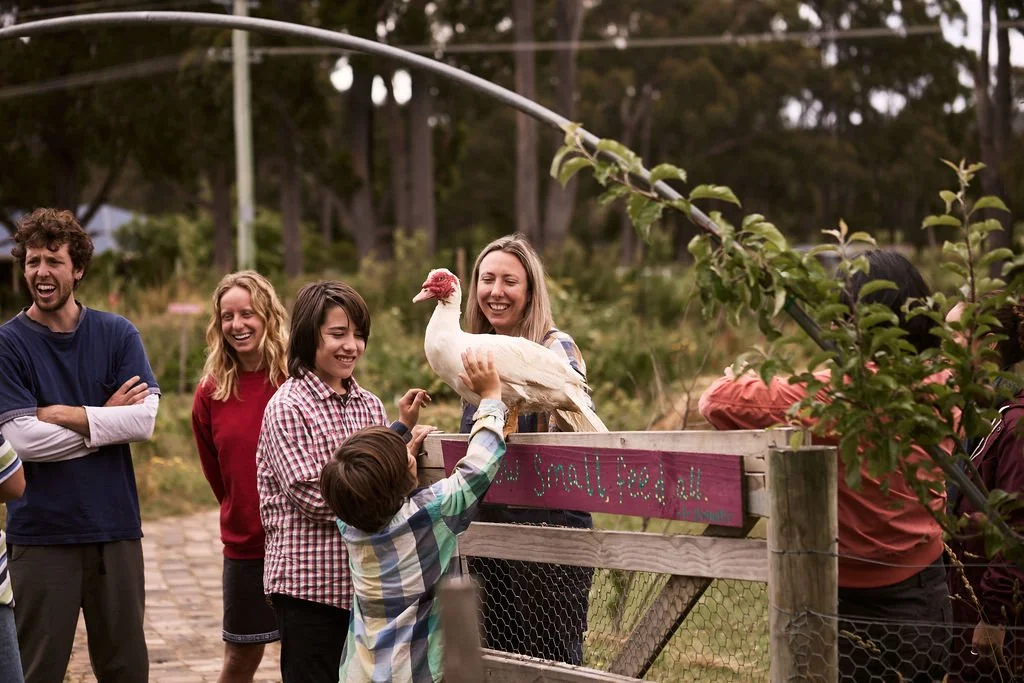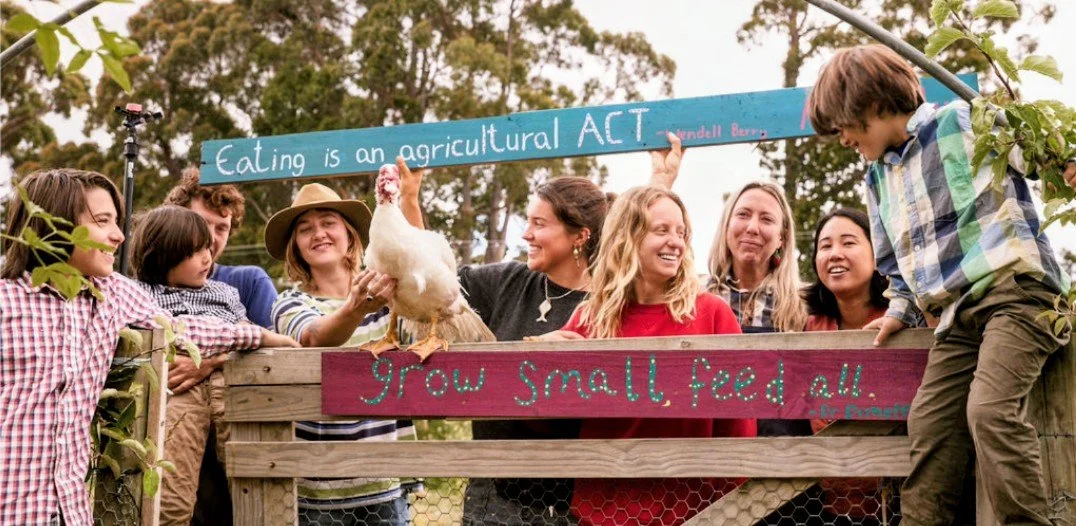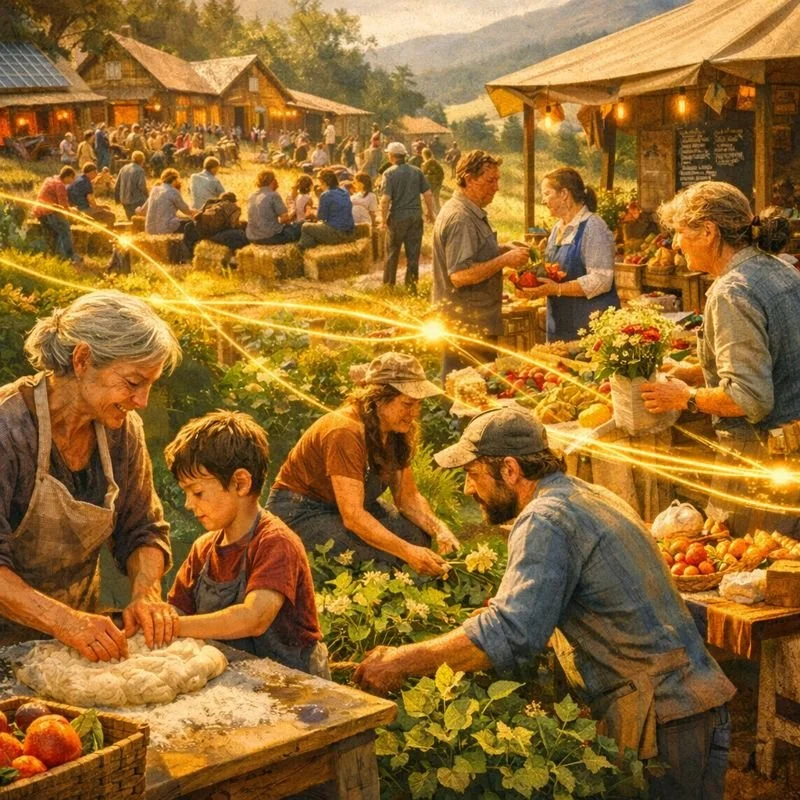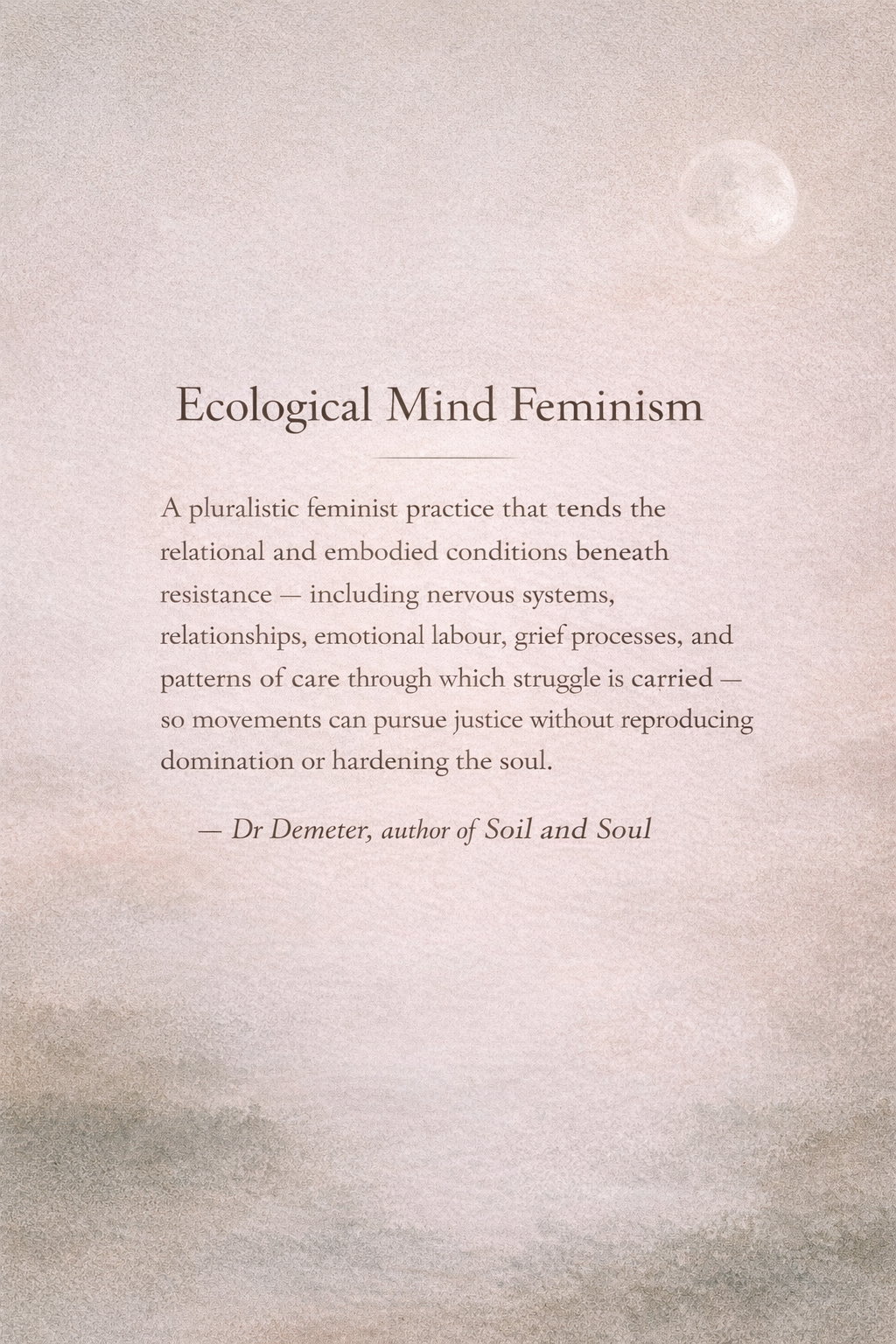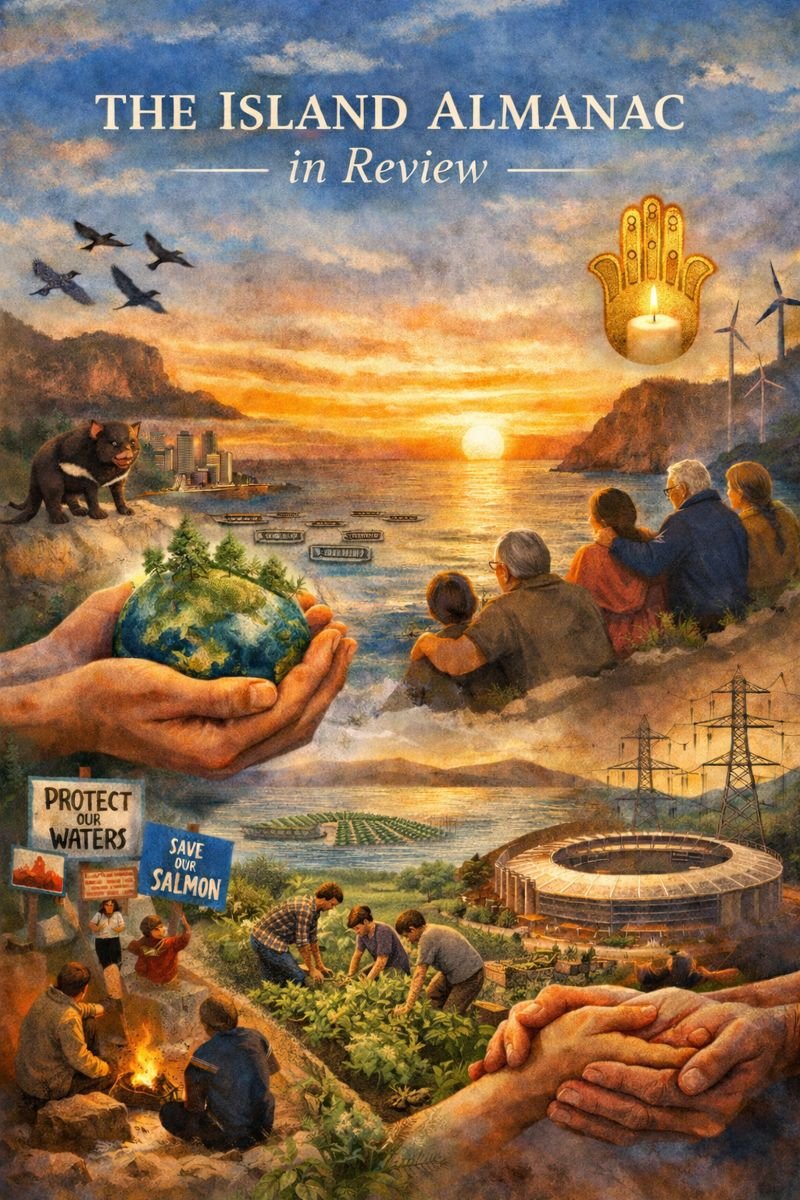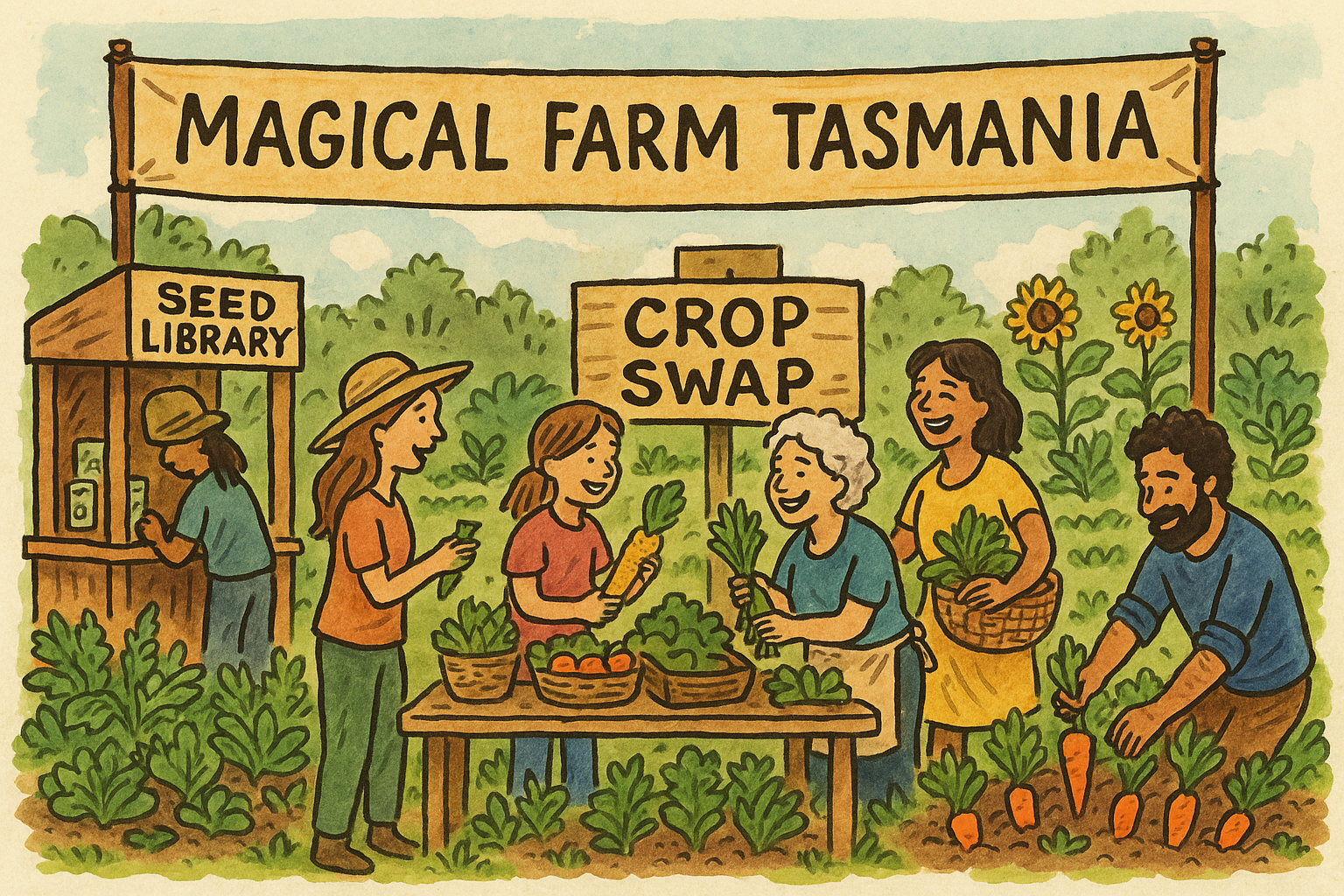“We weave ideas, scribe forward, align with life and create connection.”
— Dr Demeter | Emily Samuels-Ballantyne
Covering topics on Foundational Economics, Convivial Governance, Anthroposophic Philosophy & Everyday Regeneration in Tasmania
Overview
The Island Almanac is a living compendium of stories, tools and place-based examples that weave together foundational economics, anthroposophic wisdom and the rhythms of everyday life. Rooted in the soils of Tasmania and flowering from Magical Farm Tasmania. Across its pages you’ll find:
Practical essays on redirecting public and private wealth into community resilience
Anthroposophical reflections on seasonal rhythms, ritual and soul-led innovation
Tasmanian case studies from coastal hamlets to mountain valleys
Project spotlights on island-wide initiatives, from seed libraries to solar co-ops.
Living Architecture: A dynamic framework of interconnected practices, food, housing, energy, governance, culture, activism and economics that grows, adapts and breathes like an ecosystem, rather than standing as static policy or infrastructure. These seven pillars form the Living Architecture of Regen Era Design Studio & The Island Almanac: integrating heart, head & hands to power a truly regenerative future.
Food, Plants and Planets
Housing and Natural Building
Energy
Community Life, Learning & Culture
Sacred Activism
Convivial Governance
Regenerative Economic Design.
We Are All Designers: The Case for Life Systems Literacy
We Are All Designers: The Case for Life Systems Literacy explores the proposition that design is not confined to professional studios or academic institutions but is an inherent human activity shaping economic flows, ecological systems and cultural life. From the first tools and languages to supermarkets and digital platforms, the structures that organise society are designed and continuously redesigned through our daily participation. Drawing from an anthroposophic lens and grounded in lived practice as both farmer and design theorist, this essay argues that modern education has refined technical skill while neglecting life systems literacy. Economic flow mirrors ecological flow: where value circulates determines whether landscapes regenerate or thin, whether communities strengthen or fragment. Food, in particular, is presented not merely as nutrition but as formative infrastructure, shaping perception, culture and ultimately the futures we design.
Through the framework of Con Viv, convivial living systems design and the regional initiative Grow Small, Feed All, the article positions localised biodynamic food systems as civic and perceptual infrastructure rather than nostalgic alternatives. It introduces Living Earth College as an emerging translocal platform dedicated to embedding soil processes, cooperative economics, phenomenological observation and place-based food projects into foundational education.
Ultimately, the essay invites designers, students, policymakers and households alike to recognise their agency as co-designers of living systems and to consciously participate in shaping regenerative economic and cultural futures
Feed Tasmania from Tasmania: Living Policy for a Local Food Economy
Tasmania’s food future will not be secured by more strategy documents, but by direct, practical investment in the people and infrastructure that grow and distribute food locally. This article argues for “meaty” policy that pays small and medium farmers to feed their regions, mandates local procurement for public institutions, funds shared regional infrastructure, unlocks access to land, and provides patient community finance. By treating local food production as essential economic infrastructure, Tasmania can rebuild soil, strengthen regional economies and create a resilient food system grounded in place rather than paper.
Open and Woven: Reweaving Local Life for a Living Future
Synopsis: Open and Woven: Reweaving Local Life for a Living Future
Dr Emily Samuels-Ballantyne / Dr Demeter | Regen Era Design Studio
This article traces how SLOC: Small, Local, Open and Connected design scenario by Ezio Manzini names a long-standing pattern of resilience found in healthy villages and neighbourhoods, and why it remains vital for Tasmania, Australia, and the communities Emily now re-enters in Europe. Drawing on Creative Communities research, Illich’s conviviality, and social permaculture, she argues that everyday life is a design field where soil, society, and spirit meet.
“Small” becomes intimacy and accountability, “local” a lived belonging, “open” the capacity to learn without losing boundaries, and “connected” (or woven) the mycelial intelligence that allows communities to exchange strength without being swallowed by larger systems. Emily diagnoses the cultural thinness produced by centralised food systems and shows how local growers, village rhythms, and seasonal literacy are eroded when food is abstracted from land and relationship.
From this lineage she introduces Con Viv, her living-systems design approach, and the Grow Small Feed All campaign, which aims to support micro farms and neighbourhood food networks through policy, micro-finance, and civic imagination. She emphasises that openness must be paired with equity to avoid gentrification and displacement, and that convivial systems strengthen dignity rather than extract value.
Holding an anthroposophic sense of society as a living organism, she invites designers, policymakers, activists, growers, and neighbours to treat daily life as a legitimate site of design, and to cultivate a woven future, grounded, porous, equitable: where community life becomes strong enough to hold us all.
When the Field Can Breathe Again
This article reflects on the unseen costs of constant vigilance in contemporary movements for justice, exploring how prolonged protection can harden the soul and erode relational warmth. Drawing on the symbolism of the Cancer full moon and Venus in the underworld, it offers ecological mind feminism as a pluralistic practice that tends the relational and embodied conditions beneath resistance, supporting forms of activism that remain strong without losing their humanity.
A Year of Reweaving: Notes from The Island Almanac, 2025
In 2025, The Island Almanac became a living record of a place under pressure, and a steady refusal to let pressure collapse us into binary thinking. Moving through the year’s rupture-points (from public grief and violence to contested megaprojects, salmon industry harms, energy transition conflict, and the quiet intensity of a widening mental health crisis), the writing traced a deeper pattern: when systems harden, people harden too, unless we deliberately rebuild the village layer of life, relationship, meaning, practical competence, and shared care.
Across essays on convivial governance, foundational economics, regenerative culture, and what I call Ecological Mind Activism, the Almanac argued for a shift from activism as constant alarm to activism as ecological intelligence, measuring effectiveness not only by what we oppose, but by what we can grow: real alternatives, replicable practices, and everyday lives less dependent on extraction. At its heart, this body of work offers a new narrative for Tasmania: not a fight for the “right side,” but a practice of reweaving, where grief becomes a doorway to repair, conflict becomes a catalyst for better containers, and the future becomes something we build together, one living pattern at a time.
Ecological Mind Activism
This article challenges the dominant narrative of environmental activism by reframing the krill crisis through the deeper lens of food systems, ecological identity and regenerative community practice. It argues that industrial krill extraction is not only an oceanic tragedy, but a symptom of depleted soils, hollow food cultures and lifestyles disconnected from place. Drawing on Tasmanian case studies and place-based scenarios, the piece offers an imaginal pathway where nutrient-dense local foods, herbal traditions, community renewal schemes and land-sea reciprocity dissolve the demand for krill-based supplements altogether.
The article critiques the performative tendencies of modern activism: the adrenaline, spectacle and “thrill to save krill” and calls for a new paradigm grounded in slowness, competence and systemic cultivation. Integrating Freya Matthews’ ecological self theory with the author’s Convivial Self theory, it introduces Ecological Mind Activism: an approach where activists embody the ecological mind while practicing the convivial skills needed to regenerate community systems, redirect public funds toward life-enhancing projects and rebuild local food autonomy.
Through the work of Regen Era Design Studio, the article demonstrates how these principles can be applied in real places, offering practical tools for moving beyond resistance into renewal. Ultimately, it argues that environmental action must evolve from fighting extraction to cultivating the cultural and ecological conditions that render extraction unnecessary, inviting a shift from performance to praxis, from urgency to attunement, and from crisis to regeneration.
Beyond the Hashtag: Why Progressive Platforms Must Build Futures, Not Just Protest
In an era dominated by viral outrage and moral clarity, progressive leaders face a critical choice: remain commentators or become architects of the future. This article argues that beyond calling out injustice, whether in situations of War, Tasmania’s salmon farms, or threatened forests there lies a responsibility to foster convivial governance. By inviting communities into genuine, participatory conversations, and using imagination as a core democratic organ, movements can co-create sustainable, inclusive futures. Drawing on global examples like Barcelona’s Decidim and EcoPeace Middle East, the piece calls on platformed activists to move from critique to collaborative scenario-building, ensuring that the “day after” belongs to those who build it.
About the Author
Dr Emily Samuels-Ballantyne (also known as Dr. Demeter) is an eco-philosopher, farmer, and author of the forthcoming series The Spiral Shelves: Living Library of Magical Farm Tasmania. Her work bridges policy design, ecological healing, and the spiritual-cultural renewal of place. She works at the intersection of community resilience, regenerative governance, and embodied stewardship, inviting new myths and models for living well together in times of great change.
Holding Paradox, Healing Wounds, and Bridging Inner and Outer Worlds
In a world fractured by war and ideology, this essay explores the psychological, spiritual and manifested cost of binary thinking, especially in relation to the Israel-Palestine conflict. Drawing from Jung’s concept of the transcendent function, Marx’s critique of alienation, Levinas’ ethics of eye contact, Escobar’s pluriversal design is not about flattening difference, but about making room for many worlds to co-exist and the symbolism of Chiron and Venus, it calls for the restoration of the “Third”, a space where paradox and pain can coexist without annihilation. Dr Demeter weaves personal reflection with collective insight, highlighting how language itself can wound or heal, and how imagination, as described by Steiner and Einstein, is a vital organ for integration and transformation. Yarrow, specifically Achillea millefolium, is offered as both a literal and symbolic remedy for those seeking to hold complexity, bridging intellect and embodiment, activism and reverence.
Ultimately, the essay invites a shift from slogans to soul, from splitting to staying, and from conclusion to container, where a new, reconciliatory future might take root.
Who Counts As a Farmer? And why it matters for the future of our regions.
This piece by Dr Demeter (Emily Samuels-Ballantyne) explores the urgent need to redefine who counts as a farmer in Australia’s evolving agricultural landscape. It highlights how current government support programs like the Farm Household Allowance largely exclude small-scale, regenerative, and community-based farmers, many of whom are young people building resilient regional economies through diverse, place-based food systems. The article calls for policy reform that values ecological health, social wellbeing, and cultural vitality alongside traditional economic measures, urging recognition and support for the farmers shaping a reenerative future.
What Is Your Business Model, Local Government?
In this timely and provocative essay, What Is Your Business Model, Local Government?, Emily Samuels-Ballantyne invites a bold reimagining of the role and purpose of local government in the face of ecological collapse, social fragmentation, and bureaucratic drift. Drawing from lived experience in regenerative projects, from community harvests to Indigenous land care, she argues that local councils are too often locked into transactional models that fail to nourish the communities they claim to serve.
The essay challenges the obsession with “rates, roads, and rubbish” and calls for a cultural and functional transformation: from gatekeeping to stewardship, from abstraction to grounded care. It critiques the superficial focus on structural reform, how councils are carved up, while ignoring the deeper dysfunctions of waste, performance management, and disconnection from place.
What emerges is a clear-eyed case for a regenerative model of governance, one that centres community resilience, shared meals, public trust, and the radical possibility that local government could once again be a site of hope, not just administration.
The Fault Line Series: What Is Your Business Model?
In this sharp and grounded essay, Dr. Demeter (Emily Samuels-Ballantyne) turns the common bureaucratic question, “What is your business model?” back on local government itself. Drawing on two decades of lived experience as a community builder, policy designer, and regenerative farmer, she critiques the top-heavy policy pipelines that reduce care to documents and engagement to output metrics. With references to institutional theorists like Guy Debord, Ivan Illich, Henri Lefebvre, and Helena Norberg-Hodge, the essay explores how public funding is often diverted away from tangible outcomes into layers of abstraction and consultancy. Through the lens of her own project, the Huon Valley Food Hub, Demeter offers an alternative approach: the redirection of the brief toward grounded, co-created, and regenerative public work. The piece concludes with a call for a new kind of public service, one rooted in care, participation, and a living systems worldview.
An Ode to the Bread Man
Synopsis of “An Ode to the Bread Man”
By Dr Demeter, Magical Farm Tasmania
Each week, a quietly steadfast figure, known simply as the Bread Man, rolls up in his supply-chain truck, his lanky frame clad in a beanie and workwear, to deliver unsold loaves for the farm. What might have gone to landfill instead becomes nourishment for Emily’s geese, ducks, and chickens, whose droppings then enrich the soil. Over years, this humble ritual knits together a living circle of trust, reciprocity, and shared care.
Yet beneath its gentle rhythm lies a troubling irony: the very policies that champion “efficiency” and large-scale job growth are squeezing out small enterprises like the Bread Man’s family delivery service. While massive corporations thrive on subsidies and armies of lawyers, this heart-driven delivery driver faces closure. Drawing on Ivan Illich’s concept of convivial tools, those scaled to human hands and rooted in relationship, the essay contrasts the warmth of community-rooted exchange with the cold grind of industrial mechanisation.
Ultimately, the piece is a call to action: to reclaim economic life as a web of stories and relationships rather than a blind pursuit of scale. It urges readers to choose convivial alternatives: garden stalls, hand-crafted wares, neighbourhood bakeries and deliery services that nourish not just bodies, but soil, trust, and the very soul of place.
Beyond Left and Right: A Life-Systems Politics for Our Time
In this deeply personal and vision-led essay, Dr. Emily Samuels Ballantyne, writing as Dr. Demeter steps beyond the binaries of left and right to offer a politics rooted in care, community, and the living systems of Earth. Drawing from her years of grassroots work, spiritual practice, and institutional rejection, she shares the story of forging a life-systems politics: one that honours the household (OIKOS), values real contribution over performance, and sees regeneration not reform as the task of our time. This is a politics born in gardens, women’s circles, herbal gatherings, and quiet acts of solidarity. It is fierce, gentle, and grounded in love. A call to compost what no longer serves, and tend to the beautiful, emerging future that already lives in our communities, our bodies, and the soil beneath our feet.
An Open Letter to Naomi Klein
By Dr. Emily Samuels Ballantyne
This open letter to Naomi Klein invites a deepening of activism, beyond critique and toward connection, sacredness, and embodied care. Drawing on thinkers like Joanna Macy, Tyson Yunkaporta, Rudolf Steiner, and Levinas, the piece calls for a new wave of peace activism rooted in relational ethics, seasonal rhythm, and cultural healing and renewal. Rather than resisting harder, it urges us to feel more fully, act with integrity, and belong to each other and the Earth.
The Art of Peace: Activism Beyond Binaries and Performances
By Dr. Emily Samuels Ballantyne
This article explores the limitations of contemporary Green politics, highlighting its tendency toward urgency, reaction, and spectacle, which often disconnects it from the ecological wisdom it seeks to uphold. Drawing on Arturo Escobar's concept of the pluriverse, it advocates for design practices rooted in autonomy, emergence, and care, emphasising the importance of Indigenous knowledge systems in shaping sustainable futures.
The discussion delves into the physiological and spiritual significance of breath, referencing Rudolf Steiner's view of imagination as a spiritual organ of perception and the role of the vagus nerve in fostering relational awareness. It critiques the commodification of crisis, as analysed by Naomi Klein, and highlights the necessity of addressing the underlying spiritual wounds that fuel societal polarisation.
By integrating insights from thinkers like Vandana Shiva, Tyson Yunkaporta, David Abram, and Leanne Betasamosake Simpson, the article calls for a reimagining of activism and governance one that prioritises soil over slogans, ceremonies over campaigns, and listening to life itself. It culminates in a series of regenerative scenarios that envision systems designed for reciprocity, relationality, and belonging.
Scenario 2 Powering Regeneration in Tasmania
By Dr. Emily Samuels Ballantyne
Right now, Tasmania’s future is being shaped by a single, homogenous energy narrative “Battery of the Nation” designed and decided by a small group of stakeholders. This narrow vision risks sidelining the diverse voices, knowledge systems, and community-led solutions that are essential for a truly resilient future. In such a defining moment, we must ask: Who gets to imagine the future? A thriving Tasmania requires many scenarios, not just one. Scenario Two is an invitation to co-create not dictate what regeneration looks like, place by place.



